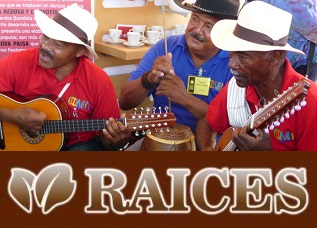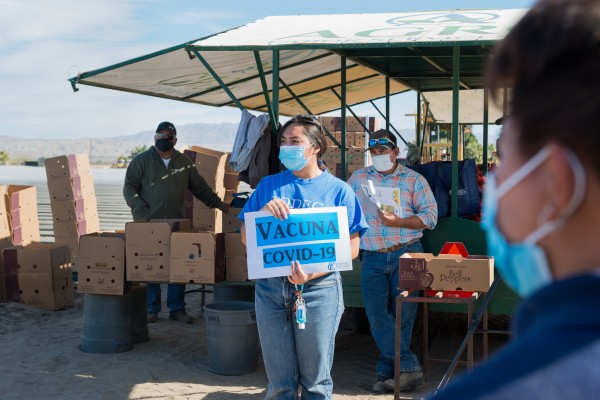
Montserrat Gómez, a volunteer with TODEC Legal Center, speaks to agricultural workers about the covid-19 vaccine. “They’re scared because they don’t have the correct information.”
Even though farmworkers are vulnerable to covid, many hesitate to get the vaccine, worried the shot could have severe side effects or signal their whereabouts to immigration officials. Immigrant advocates in the Coachella Valley and other farming regions are visiting workers to try to allay their fears.
By Heidi de Marco | Kaiser Health News | California Healthline | @heidi_demarco
MECCA, Calif. — Dust swirled in the air as Luz Gallegos parked her SUV on the side of a dirt road. She had just learned that her aunt died of covid-19 — the third family member to succumb to the virus in only two weeks.
She stepped out of her car about 11:30 a.m. onto a bell pepper farm in this agricultural community in the Coachella Valley, a little northwest of the Salton Sea.
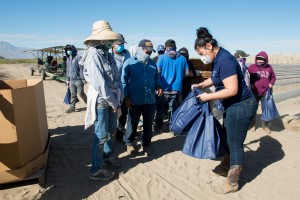
TODEC Executive Director Luz Gallegos hands out bags that include coronavirus vaccine pamphlets, a box each of gloves and masks, hand sanitizer and a gift card to a grocery store.
Gallegos, a daughter of farmworkers who had worked in the fields herself, had just 15 minutes to make what she considered a life-or-death pitch to roughly 20 workers who had just finished a break.
The farm had already seen two workers fall ill to covid.
“We’re losing people in our community each day,” she said.
Gallegos, now executive director of the immigrant advocacy group TODEC Legal Center, came to dispel myths about the covid vaccines and urge the farmworkers to get it. Farmworkers, who are among the most vulnerable to covid, are also among the most hesitant to get the shots.
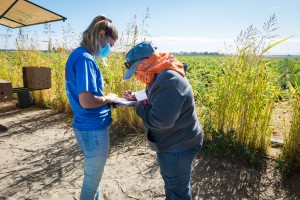
Volunteer Naomi Martinez helps Maria Gasca sign up for a grocery store gift card. Gasca, who has worked in the fields since she migrated from Michoacán, Mexico, 21 years ago, is reluctant to get a covid vaccine. “I hear that some people have died after getting it,” she says. But after hearing the presentation about the safety and efficacy of the vaccines, Gasca says “the information is encouraging.”
Some worry about the vaccines’ safety and potential side effects, or how they could affect people with underlying health conditions, like diabetes. Others express the unfounded rumor that the government will use the vaccines to implant chips into their arms, leading to their being tracked and deported.
“This community lives in fear,” Gallegos said. “They don’t have any confidence in the government.”
A study out in late January from the University of California-San Francisco found that farmworkers and other agricultural workers had the third-highest risk of death during the pandemic in California, after cooks and packaging machine operators.
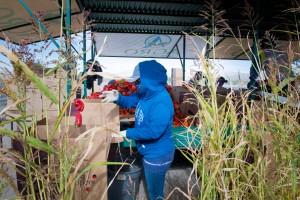
Norma Torres, 44, says she’s more confident about getting a vaccine after hearing that Gallegos got one herself. “Sometimes we believe things just because we see it on Facebook,” she said of vaccine myths. “I heard about the chip, but I don’t believe it.”
“That’s higher than doctors or nurses,” said Alicia Riley, an epidemiology and biostatistics postdoctoral scholar at UCSF who worked on the study. “With vaccination, we now have a new tool available to protect these workers who have endured the highest rate of excess mortality during the pandemic.”
Since October, Gallegos has been visiting farms throughout Riverside County.
She just got the first dose of vaccine herself, a detail she shared with the farmworkers gathered around her. “I didn’t get any side effects, but some say it feels like a bruise on your arm,” she told them in Spanish.
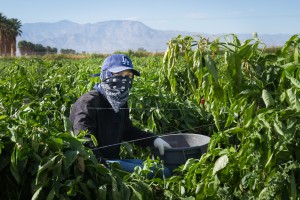
Farmworker Erwin Sandoval, 21, had been skeptical about getting the vaccine because he feared the potential side effects, but he reconsidered after learning that friends his age back home in El Salvador had died of covid.
Gallegos had started off the talk by claiming a victory: “We won. They’re going to prioritize farmworkers in the first phases of the vaccine.”
Gov. Gavin Newsom confirmed this week that farmworkers will be prioritized for the shots, along with health care workers, people age 65 and up, and workers in education, child care, emergency services, and food and agriculture.
Diana Tellefson Torres, executive director of the UFW Foundation, said agricultural workers check all the boxes when it comes to vulnerability: They often work in close proximity, travel from farm to farm across county borders, live in crowded housing and in multigenerational households, and lack health care.
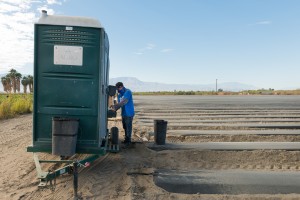
Farmworker David Lopez takes a quick break. He says he’s diligent about wearing his mask and washing his hands. “I’d rather risk the side effects of the vaccine than bring it home to my family.”
“We know that this is a large task,” Tellefson Torres said. “But there are different levels of vulnerability in our society right now, and I can’t emphasize enough that we need to take care of those who are nurturing us right now.”
This story was produced by KHN (Kaiser Health News), which publishes California Healthline, an editorially independent service of the California Health Care Foundation. KHN is not affiliated with Kaiser Permanente.



